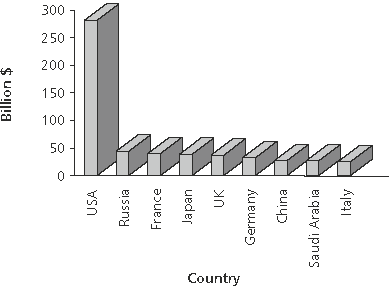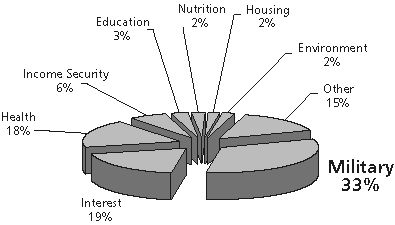Ruling the Empire
U.S. elites mean to prevent anyone, anywhere, from ever challenging the preeminence of American imperial power. Just ask them.
This article is from the January/February 2003 issue of Dollars and Sense: The Magazine of Economic Justice available at http://www.dollarsandsense.org

This article is from the January/February 2003 issue of Dollars & Sense magazine.
Subscribe Now
at a discount.
Every few years, the President issues a document called the "National Security Strategy of the United States." Always eagerly awaited, the document is often described as the administration's "blueprint" for U.S. foreign policy. But it's really more like a press release, designed to give the U.S. government's global aims a noble-sounding spin.
The Bush administration's new "National Security Strategy," issued September 2002, abounds with pious lip service: On the subject of democracy, it applauds the "elected leaders replac[ing] generals in Latin America" without mentioning who put the generals in power in the first place. On the environment, it calls for "global efforts to stabilize greenhouse gas concentrations" without mentioning that the U.S. government had scuttled the Kyoto Protocol. On the global economy, it decries as "neither just nor stable" a state of affairs "where some live in comfort and plenty, while half of the human race lives on less than $2 a day," yet it offers no solution other than more "free markets and free trade."
The document's crowning hypocrisy, however, is its repeated use of the buzz-phrase "a balance of power that favors freedom," as if that were what the U.S. government was really after. You get the distinct feeling that the drafters don't believe in it for a minute. By its final and most important section, on the country's "National Security Institutions," the document abandons all pretext. The "unparalleled strength of the United States armed forces, and their forward presence, have maintained the peace," it declares. The United States must "reaffirm the essential role of American military strength" and "build and maintain our defenses beyond challenge." It must maintain forces "strong enough to dissuade potential adversaries" from the dream of ever "surpassing, or equaling, the power of the United States."
Well, if those are the real aims of U.S. ruling elites, they're off to a good start. In 2001, U.S. military spending—the highest, by far, of any country in the world—exceeded the combined spending of the next eight countries—Russia, France, Japan, the United Kingdom, Germany, China, Saudi Arabia, and Italy (see Graph 1). In fact, U.S. military spending represented over one third of the total of the entire world. This grotesquely overgrown war machine comes at no little cost. In 2001, total federal military spending (including interest payments on past military spending and benefits for former military personnel) devoured about one third of the federal funds portion of the budget (not including trust fund items like Social Security), as much as spending on health, income security, education, nutrition, and housing combined (see Graph 2).
2001 Military Spending

Source: Stockholm International Peace Research Institute, SIPRI Yearbook 2002.
2001 Federal Funds Budget
(Excludes Social Security)

Source: National Priorities Project. Includes only the federal funds portion of the federal budget. Military includes veterans' benefits and the military share of interest on the national debt.
In light of these realities, the "balance of power" rhetoric isn't really fooling anybody. Writing in the mainstream Christian Science Monitor, Gail Russell Chaddock argues that the document "asserts American dominance as the lone superpower —a status no rival power will be allowed to challenge." It is a vision, she says, of a "Pax Americana" (the modern-day equivalent of Roman imperial power). Even the senior defense policy analyst at the right-wing Cato Institute, Charles V. Peña, writes that "although it's all dressed up with the rationale of extending liberty, democracy, and freedom around the globe (except, of course, in Saudi Arabia and Pakistan)" the document really envisions a "Pax Americana enforced by dominant military power and … U.S. forces deployed around the globe."
None of this is exactly news. The United States, after all, has been a major imperial power in the Western Hemisphere for over a century. And it has been the single dominant capitalist power for more than half that period. The truth, however, should be clearer than ever. As the title of Peña's article puts it: "The New National Security Strategy Is American Empire."
